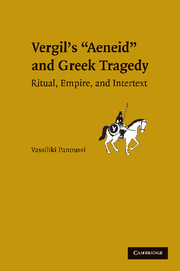Description
Vergil's Aeneid and Greek Tragedy
Ritual, Empire, and Intertext
Author: Panoussi Vassiliki
This book is a systematic study of the importance of Greek tragedy as a fundamental 'intertext' for Vergil's Aeneid.
Language: English
Subject for Vergil's Aeneid and Greek Tragedy:
Approximative price 49.66 €
In Print (Delivery period: 14 days).
Add to cart
Vergil's Aeneid and Greek Tragedy
Publication date: 01-2014
Support: Print on demand
Publication date: 01-2014
Support: Print on demand
Approximative price 67.44 €
Subject to availability at the publisher.
Add to cart
Greek tragedy in vergil's aeneid : ritual, empire, and intertext
Publication date: 03-2009
272 p. · 15.8x23.5 cm · Hardback
Publication date: 03-2009
272 p. · 15.8x23.5 cm · Hardback
Description
/li>Contents
/li>Biography
/li>
This book is a systematic study of the importance of Greek tragedy as a fundamental 'intertext' for Vergil's Aeneid. Vassiliki Panoussi argues that the epic's representation of ritual acts, especially sacrifice, mourning, marriage, and maenadic rites, mobilizes a connection to tragedy. The tragic-ritual model offers a fresh look into the political and cultural function of the Aeneid, expanding our awareness of the poem's scope, particularly in relation to gender, and presenting new readings of celebrated episodes, such as Anchises' games, Amata's maenadic rites, Dido's suicide, and the killing of Turnus. She interprets the Aeneid as a work that reflects the dynamic nature of Augustan ideology, contributing to the redefinition of civic discourse and national identity. In her rich study, readers will find a unique exploration of the complex relationship between Greek tragedy and Vergil's Aeneid and a stimulating discussion of problems of gender, power, and ideology in ancient Rome.
Part I. Ritual: 1. Ritual violence and the failure of sacrifice; 2. Suicide, devotion, and ritual closure; 3. The fragility of reconciliation: ritual restoration and the devine; 4. Maenad brides and the destruction of the city; 5. Mourning glory: ritual lament and Roman civic identity; Part II. Empire: 6. Heroic identity: Vergil's Ajax; 7. Contesting idealologies: ritual and empire.
Vassiliki Panoussi is Assistant Professor of Classical Studies at the College of William and Mary.
© 2024 LAVOISIER S.A.S.
These books may interest you

P. Vergili Aeneidos Liber Primus 30.28 €



